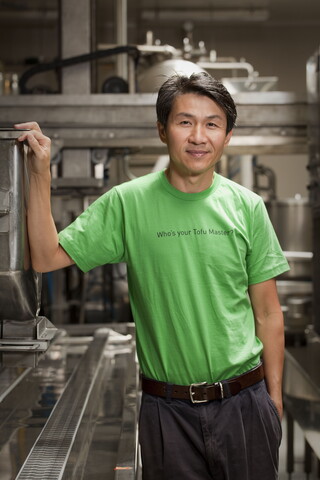The Tofu Meritocrat

Minh Tsai was working at Charles Schwab when the dotcom bubble burst. He weathered two rounds of layoffs. He watched hardworking and capable colleagues forced out while others who he felt were not as competent stayed on. He recognized politics at play and, as a first-generation immigrant from Vietnam who had risen into the ranks of a white-collar profession, felt his first pangs of disillusionment with American meritocracy. Shouldn’t the best be recognized for its bestness?
He left his job and started working in small tofu shops around San Francisco, eventually setting off to start a company of his own, Hodo Soy. “To be honest with you, it was a crazy idea,” Tsai said on November 10th as part of the Bright Lights, Green Sights speaker series. He had never worked in food, only finance, but he grew up eating really good tofu and wanted to recreate the food of his childhood, the silky blocks sold fresh every day.
Tsai began by selling his tofu at local farmers’ markets—“a great place to launch a food business,” he said—eventually expanding to stalls at 12 markets across the city. When he’d established a customer base and about half a million in annual sales, Tsai sited and constructed a plant in Oakland. Today, after 10 years in business, Hodo Soy makes 30,000 pounds of tofu each day and employs about 80 people. (Tsai emphasized that if you want to make a quick buck don’t go into food.) The company works with only organic farmers in the U.S. and encourages them to experiment with soybean types; though more than 200 varieties existed, not more than about 10 are used in industrial production today. Hodo, explained Tsai, is interested in “extending the varieties of organic soybeans” both used by and available to the soy market.
Building the plant also gave Tsai a chance to run “an experiment related to meritocracy,” he said. He tells his employees, “If you learn and grow [at the plant], then you will get more responsibility and salary.” Because Hodo employs a lot of immigrants, Tsai has promised to help employees learn English; he is committed to gender diversity, too, with a nearly even split between men and women. And if employees don’t feel that internal opportunities are keeping up with their expectations, then Tsai has made it the company’s responsibility to help them find another job. That said, he offers “a meaningful wage,” health and dental insurance, as well as a 401K program with 4% match, which means that turnover is less than 5 percent. Most labor operations have a turnover rate of 100 percent. “This is a social experiment that I started,” said Tsai. “We deal a lot with issues of fairness.”
Ultimately, Tsai started Hodo “to take back tofu, to make it taste good again,” he said. “It was introduced as a vegetarian food—well, let’s forget about that. It was introduced as an Asian food—let’s forget about that, too.” This coming year, he’s launching Tofu Disrupt events in San Francisco and New York City. He’s collaborating with top chefs across the country to expand the base of recipes, to educate people about broad and innovative uses for tofu as an ingredient. He currently provides Chipotle with tofu for their Sofritas. It’s only a matter of time, he said, until mindsets change, until people accept tofu as a food of its own rather than a niche alternative to meat. “And maybe this is the moment,” he thought out loud, looking at the audience. “I mean, I’m talking at Yale!”